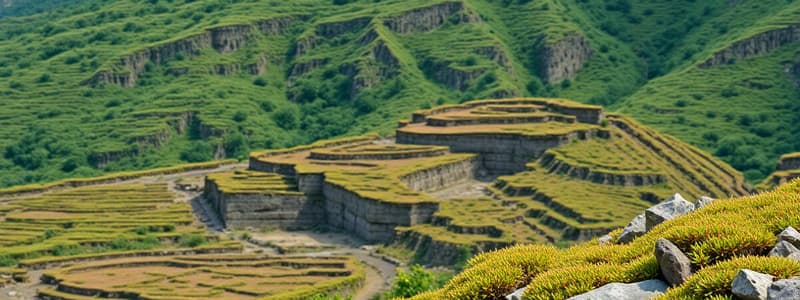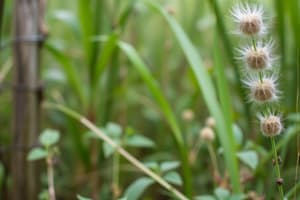Podcast
Questions and Answers
What role does nature play in climate regulation?
What role does nature play in climate regulation?
- It reduces the amount of sunlight reaching the Earth.
- It generates oxygen through photosynthesis.
- It absorbs carbon dioxide from the atmosphere. (correct)
- It stabilizes the Earth’s rotational axis.
Which practice is crucial for minimizing environmental harm when managing natural resources?
Which practice is crucial for minimizing environmental harm when managing natural resources?
- Implementing sustainable practices. (correct)
- Exploiting resources for immediate economic gain.
- Ignoring the impact of resource extraction.
- Overconsumption of resources.
Which of the following is NOT a benefit provided by nature?
Which of the following is NOT a benefit provided by nature?
- Mental and physical health improvement.
- Increased pollution levels. (correct)
- Raw materials for technology.
- Food and water resources.
Why is understanding nature particularly important for human well-being?
Why is understanding nature particularly important for human well-being?
Which factor contributes to the economic value derived from nature?
Which factor contributes to the economic value derived from nature?
What is a key benefit of high biodiversity within ecosystems?
What is a key benefit of high biodiversity within ecosystems?
Which of the following is NOT considered an abiotic factor?
Which of the following is NOT considered an abiotic factor?
What process is essential for nutrient cycling within ecosystems?
What process is essential for nutrient cycling within ecosystems?
Which type of ecological interaction involves one organism consuming another?
Which type of ecological interaction involves one organism consuming another?
Which of the following best describes geological processes?
Which of the following best describes geological processes?
What is the primary consequence of human activities on nature?
What is the primary consequence of human activities on nature?
Which type of interspecies relationship benefits both organisms involved?
Which type of interspecies relationship benefits both organisms involved?
Natural phenomena can often be categorized into which of the following?
Natural phenomena can often be categorized into which of the following?
Flashcards
Sustainable Practices
Sustainable Practices
Strategies that use natural resources responsibly to minimize environmental harm.
Resource Provision
Resource Provision
Nature provides essential resources like food, water, wood, and minerals.
Climate Regulation
Climate Regulation
Nature regulates Earth's temperature by absorbing carbon dioxide.
Nutrient Cycling
Nutrient Cycling
Signup and view all the flashcards
Human Well-being
Human Well-being
Signup and view all the flashcards
What is an ecosystem?
What is an ecosystem?
Signup and view all the flashcards
What is biodiversity?
What is biodiversity?
Signup and view all the flashcards
What are geological processes?
What are geological processes?
Signup and view all the flashcards
What are natural phenomena?
What are natural phenomena?
Signup and view all the flashcards
What are abiotic factors?
What are abiotic factors?
Signup and view all the flashcards
What are biotic factors?
What are biotic factors?
Signup and view all the flashcards
What is a food web?
What is a food web?
Signup and view all the flashcards
What is symbiosis?
What is symbiosis?
Signup and view all the flashcards
Study Notes
Introduction to Nature
- Nature encompasses all naturally occurring living and non-living things, excluding artificial creations.
- This includes plants, animals, landscapes, rocks, and all natural phenomena.
- It's a vast, complex system including ecosystems, biodiversity, and geological processes.
- Natural processes are the foundation for life on Earth.
Components of Nature
- Ecosystems: Interconnected systems of plants, animals, and their physical environment; dynamic, involving energy and nutrient flow.
- Biodiversity: The variety of life on Earth, from genes to ecosystems; high biodiversity is critical for ecosystem stability and resilience.
- Geological processes: Earth's crust processes, including plate tectonics, erosion, mountain and valley formation; shaping the Earth's surface and influencing climate.
- Natural Phenomena: Events like weather patterns, earthquakes, volcanic eruptions, and storms; these can be both destructive and constructive.
- Abiotic factors: Non-living components (air, water, soil, sunlight, temperature); essential for sustaining life.
- Biotic factors: Living components (animals, plants, fungi, bacteria); interacting with each other and abiotic factors.
Interactions within Nature
- Food webs: Complex networks of feeding relationships, transferring energy and nutrients through ecosystems.
- Symbiosis: Close relationships between different species (mutualism, commensalism, parasitism).
- Competition: Inter-species interactions when resources are limited.
- Predation: One organism consuming another; predators and prey affect each other through natural selection.
- Decomposition: Breakdown of dead matter; returning nutrients to soil, essential for nutrient cycling.
Human Interaction with Nature
- Environmental Impact: Human activities significantly alter ecosystems and harm biodiversity; pollution, deforestation, and climate change cause severe consequences.
- Conservation Efforts: Preserving and protecting natural resources and ecosystems.
- Sustainable Practices: Managing natural resources to minimize environmental harm.
Importance of Nature
- Resource Provision: Nature provides essential resources (food, water, timber, minerals).
- Climate Regulation: Nature plays a key role in Earth's climate regulation; forests, oceans, and ecosystems absorb CO2.
- Nutrient Cycling: Nature cycles vital elements for life, ensuring their availability for growth and ecosystem sustainability.
- Human Well-being: Exposure to nature improves mental and physical health.
- Economic Contribution: Tourism, recreation, and industries rely on natural resources and environments.
Conclusion
- Nature is a complex, interconnected web of life and processes.
- Understanding nature is vital for both human well-being and planetary preservation.
- Sustaining nature is essential for human survival.
Studying That Suits You
Use AI to generate personalized quizzes and flashcards to suit your learning preferences.




